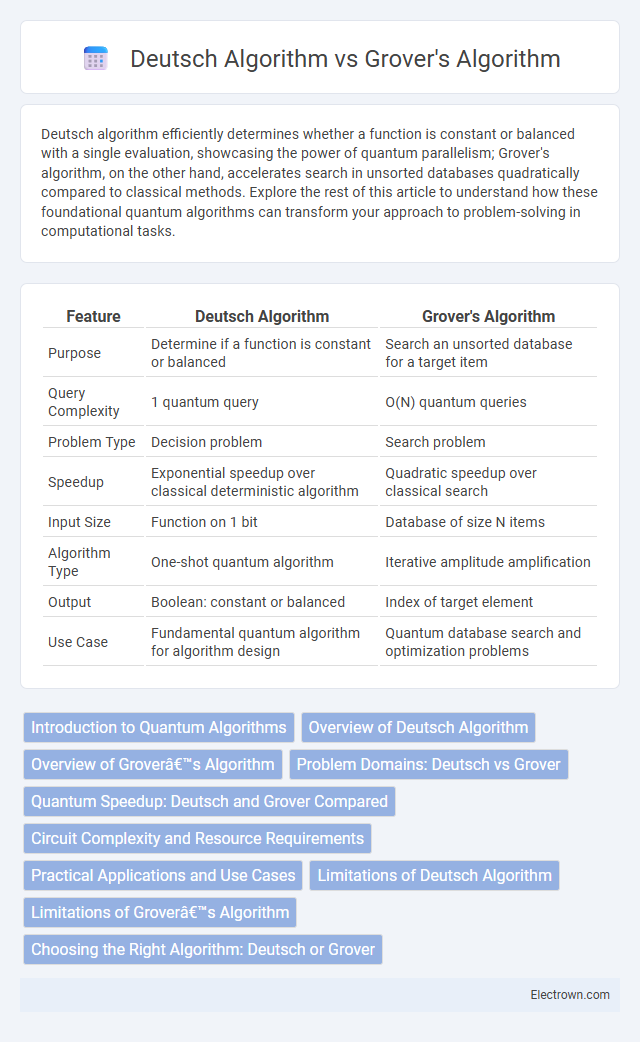Deutsch algorithm efficiently determines whether a function is constant or balanced with a single evaluation, showcasing the power of quantum parallelism; Grover's algorithm, on the other hand, accelerates search in unsorted databases quadratically compared to classical methods. Explore the rest of this article to understand how these foundational quantum algorithms can transform your approach to problem-solving in computational tasks.
Table of Comparison
| Feature | Deutsch Algorithm | Grover's Algorithm |
|---|---|---|
| Purpose | Determine if a function is constant or balanced | Search an unsorted database for a target item |
| Query Complexity | 1 quantum query | O(N) quantum queries |
| Problem Type | Decision problem | Search problem |
| Speedup | Exponential speedup over classical deterministic algorithm | Quadratic speedup over classical search |
| Input Size | Function on 1 bit | Database of size N items |
| Algorithm Type | One-shot quantum algorithm | Iterative amplitude amplification |
| Output | Boolean: constant or balanced | Index of target element |
| Use Case | Fundamental quantum algorithm for algorithm design | Quantum database search and optimization problems |
Introduction to Quantum Algorithms
Deutsch algorithm exemplifies early quantum algorithms that solve specific problems faster than classical counterparts by using quantum superposition and interference. Grover's algorithm provides a quadratic speedup for unstructured search problems, significantly reducing the time complexity compared to classical linear search. Your understanding of these foundational quantum algorithms highlights how quantum computing exploits unique principles to achieve computational advantages.
Overview of Deutsch Algorithm
The Deutsch algorithm is a pioneering quantum algorithm designed to determine whether a given function is constant or balanced with only one evaluation, showcasing the power of quantum parallelism. It operates on a single qubit input and applies a quantum oracle followed by a Hadamard transform to produce the result with certainty in fewer steps than classical counterparts. Understanding this algorithm is foundational for grasping more complex quantum algorithms, including Grover's search algorithm.
Overview of Grover’s Algorithm
Grover's Algorithm is a quantum search algorithm designed to find a marked item within an unsorted database of N elements with a quadratic speedup, requiring approximately N queries. It leverages amplitude amplification through iterative applications of the Grover operator, enhancing the probability of measuring the desired state. Your quantum computing tasks can benefit from Grover's Algorithm when searching large, unstructured datasets more efficiently than classical algorithms.
Problem Domains: Deutsch vs Grover
Deutsch algorithm excels in determining whether a function is constant or balanced using minimal queries, making it ideal for promise problems and function classification tasks. Grover's algorithm is optimized for searching unsorted databases, offering a quadratic speedup in solving unstructured search problems and optimization challenges. Your choice between these algorithms depends on whether you need rapid function property evaluation (Deutsch) or efficient database searching (Grover).
Quantum Speedup: Deutsch and Grover Compared
Deutsch algorithm demonstrates quantum speedup by solving the oracle problem with a single query, exponentially outperforming classical deterministic algorithms that require multiple queries. Grover's algorithm offers a quadratic speedup in unsorted database search, reducing the search complexity from O(N) to O(N), which is significant for large-scale data. Both algorithms highlight different aspects of quantum speedup, with Deutsch showcasing exponential efficiency in function evaluation and Grover improving search tasks via amplitude amplification.
Circuit Complexity and Resource Requirements
Deutsch algorithm features a simpler circuit with only one qubit and one oracle query, resulting in minimal resource requirements and low gate complexity. Grover's algorithm scales with the size of the search space, requiring O(N) oracle queries and multiple qubits, leading to increased circuit depth and more complex gate arrangements. Consequently, Grover's algorithm demands more quantum resources and error correction overhead compared to the relatively lightweight Deutsch algorithm.
Practical Applications and Use Cases
Deutsch algorithm is mainly used for demonstrating quantum parallelism and solving simple promise problems, making it ideal for foundational research and quantum computing education. Grover's algorithm excels in practical applications like unstructured database search, cryptographic key recovery, and optimization problems, offering a quadratic speedup over classical approaches. Your quantum computing projects will benefit from Grover's algorithm when dealing with large datasets, while Deutsch's algorithm remains valuable for understanding core quantum principles.
Limitations of Deutsch Algorithm
The Deutsch algorithm is limited to determining whether a function is constant or balanced for a single-bit input, which restricts its applicability to more complex computational problems. It does not offer speedup for larger inputs, unlike Grover's algorithm, which provides quadratic speedup for unstructured search problems over multiple bits. These constraints make the Deutsch algorithm primarily a theoretical tool rather than a practical algorithm for extensive quantum computation tasks.
Limitations of Grover’s Algorithm
Grover's algorithm excels at searching unsorted databases with quadratic speedup but faces limitations when applied to problems lacking a structured oracle or when the dataset size is unknown. Its efficiency decreases in the presence of noise and decoherence, which are common in real quantum systems, restricting practical implementation. You should consider that unlike the Deutsch algorithm, which solves specific promise problems deterministically, Grover's algorithm provides probabilistic results, requiring multiple runs for high confidence outcomes.
Choosing the Right Algorithm: Deutsch or Grover
Choosing between the Deutsch algorithm and Grover's algorithm depends on the problem's nature: Deutsch's algorithm excels in determining whether a given function is constant or balanced with a single query, making it ideal for simple decision problems. Grover's algorithm is suited for searching unsorted databases, providing a quadratic speedup in locating a target item among N possibilities. Your selection should align with whether you need efficient function classification (Deutsch) or optimized search capabilities (Grover).
Deutsch algorithm vs Grover’s algorithm Infographic

 electrown.com
electrown.com